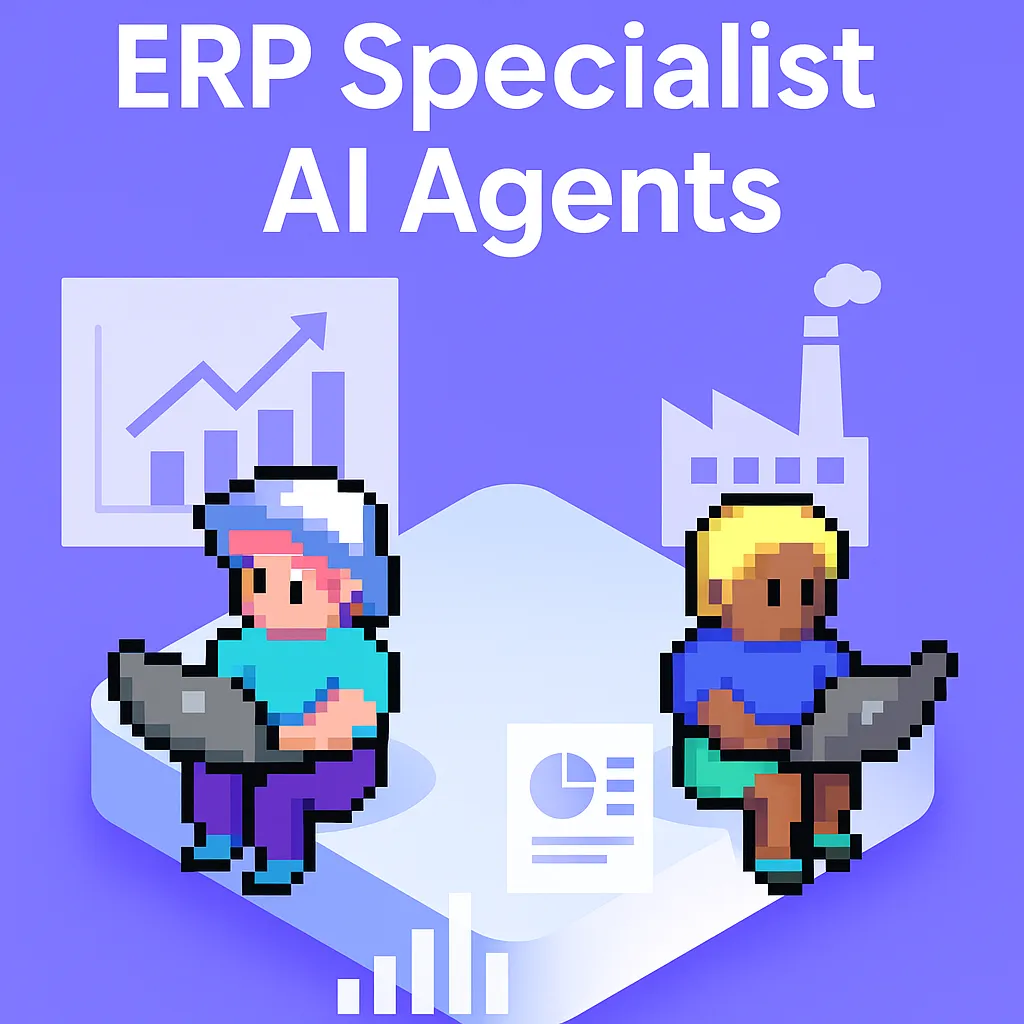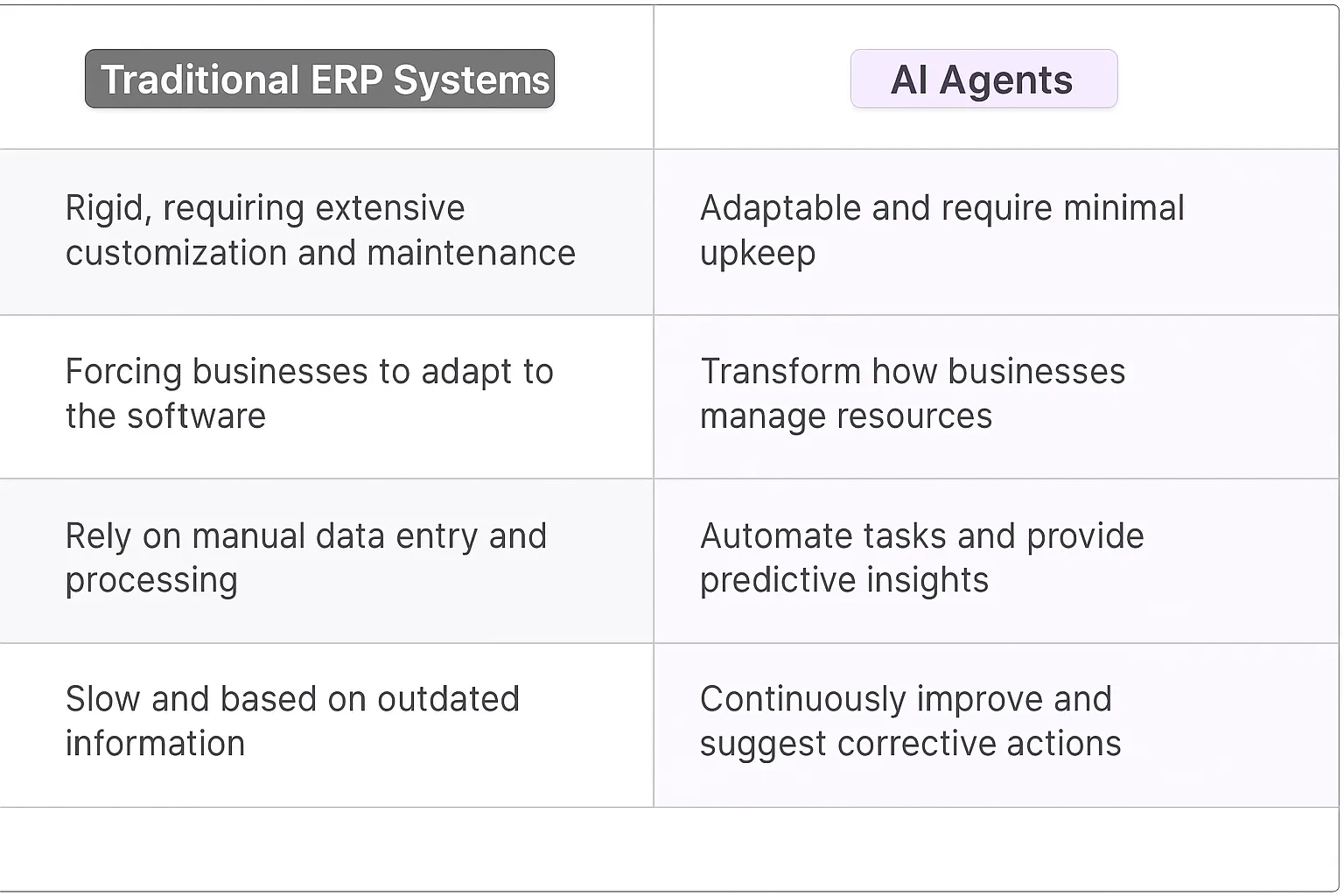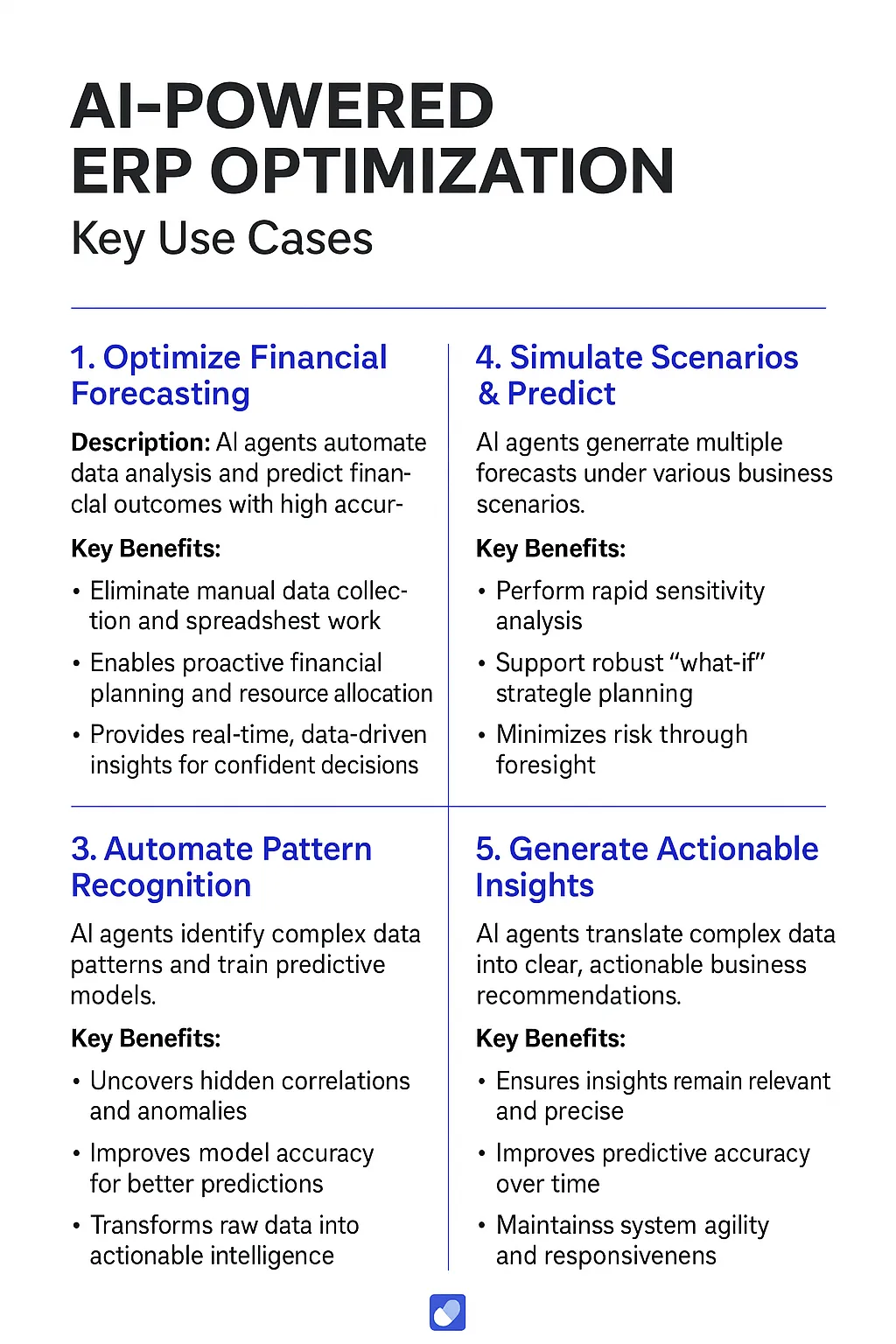An ERP Specialist is a digital teammate that leverages artificial intelligence to enhance and optimize enterprise resource planning systems. It's not just a fancy add-on to existing ERP software; it's a game-changing technology that's redefining how businesses manage their core processes. These AI agents are designed to handle complex tasks, analyze vast amounts of data, and provide actionable insights in real-time.
ERP Specialist AI Agents come packed with features that set them apart from traditional ERP systems:
These features combine to create a powerful tool that's not just automating tasks, but augmenting human capabilities and driving strategic decision-making.

Before AI agents entered the scene, ERP systems were like clunky, overgrown spreadsheets on steroids. Companies relied on armies of data entry clerks, analysts, and managers to manually input, process, and interpret vast amounts of business data. It was a slow, error-prone process that often led to decision-making based on outdated information.
Traditional ERP systems were rigid, requiring extensive customization and constant maintenance. They were like trying to fit a square peg into a round hole – forcing businesses to adapt their processes to the software rather than the other way around. The result? Frustrated employees, inefficient operations, and missed opportunities for growth and innovation.
Enter AI agents – the game-changers in the ERP world. These digital teammates are transforming how businesses manage their resources, making ERP systems smarter, more adaptable, and infinitely more valuable. Here's why they're a big deal:
1. Predictive Analytics on Steroids: AI agents don't just crunch numbers; they see patterns and trends that humans might miss. They're constantly learning from your business data, providing insights that can help you make better decisions faster. It's like having a crystal ball that actually works.
2. Automation That Actually Makes Sense: Unlike rigid, rule-based automation, AI agents can handle complex, nuanced tasks. They can manage inventory, optimize supply chains, and even handle customer inquiries with a level of sophistication that was previously unimaginable. This frees up your team to focus on high-value, strategic work.
3. Personalization at Scale: AI agents can tailor the ERP experience for each user, presenting relevant information and suggesting actions based on their role, preferences, and past behavior. It's like having a personal assistant for every employee, but one that never needs coffee breaks.
4. Continuous Improvement: These digital teammates are always learning, always improving. They adapt to changes in your business environment, refining their algorithms to provide ever more accurate predictions and recommendations. It's like having a system that gets smarter every day, without needing to attend a single training session.
5. Natural Language Processing: Forget complex query languages or clunky interfaces. With AI agents, users can interact with their ERP system using natural language. It's like having a conversation with your data, making insights accessible to everyone, not just the tech-savvy few.
6. Proactive Problem Solving: AI agents don't wait for problems to escalate. They can identify potential issues before they become critical, suggesting corrective actions or even implementing them automatically. It's like having a team of psychic troubleshooters working 24/7.
The bottom line? AI agents are turning ERP from a necessary evil into a strategic advantage. They're not just making businesses more efficient; they're enabling new ways of working, new business models, and new opportunities for growth. In the world of ERP, AI agents aren't just a nice-to-have – they're becoming the price of admission for companies that want to stay competitive in the digital age.

ERP systems are the backbone of modern enterprises, but they're often complex beasts that can be challenging to navigate. Enter AI agents specialized in ERP - these digital teammates are poised to transform how businesses interact with their ERP systems, making them more accessible and actionable than ever before.
The integration of AI agents into ERP systems isn't just about automation - it's about augmentation. These digital teammates are set to amplify human capabilities, allowing businesses to extract more value from their ERP investments and operate with unprecedented efficiency and insight. As AI technology continues to evolve, we can expect these agents to become even more sophisticated, potentially reshaping the very nature of how businesses operate and make decisions.

Enterprise Resource Planning (ERP) Specialist AI agents are reshaping how businesses manage their core processes. These digital teammates aren't just fancy add-ons; they're becoming essential players in the ERP ecosystem. Let's dive into some real-world scenarios where these AI agents are making waves across different sectors.
The beauty of these AI-powered ERP specialists lies in their ability to adapt and excel in various industries. They're not one-trick ponies but versatile problem-solvers that can tackle complex challenges unique to each business landscape. From manufacturing to healthcare, retail to finance, these AI agents are proving their worth by enhancing efficiency, accuracy, and decision-making capabilities.
As we explore these use cases, you'll see how ERP Specialist AI agents are transforming traditional workflows into dynamic, intelligent processes. They're not just automating tasks; they're elevating entire operations to new levels of productivity and insight. Get ready to see how these digital teammates are becoming indispensable assets in the modern business toolkit.
The manufacturing industry is ripe for disruption by ERP Specialist AI Agents. These digital teammates are poised to transform how factories operate, manage resources, and optimize production lines.
Consider a large automotive manufacturer struggling with supply chain bottlenecks and production inefficiencies. By deploying an ERP Specialist AI Agent, they can tap into a powerhouse of data analysis and predictive capabilities.
This AI agent doesn't just crunch numbers; it becomes the central nervous system of the entire operation. It continuously monitors inventory levels, production rates, and supply chain dynamics in real-time. When a potential shortage of critical components looms, the agent proactively alerts procurement teams and suggests alternative suppliers or materials.
But here's where it gets interesting: the ERP Specialist AI Agent goes beyond reactive measures. It learns from historical data, market trends, and even external factors like geopolitical events or weather patterns that could impact the supply chain. This allows it to forecast demand with uncanny accuracy, helping the manufacturer optimize production schedules and inventory levels.
The result? A lean, agile manufacturing process that adapts to market demands in near real-time. Overproduction becomes a thing of the past, while stockouts are minimized. The factory floor transforms into a symphony of efficiency, with just-in-time delivery of components and a production line that hums along at optimal capacity.
This isn't just about cost savings (though those are substantial). It's about creating a competitive edge in a cutthroat industry. The manufacturer can now offer shorter lead times, customize products more easily, and respond to market shifts with lightning speed.
The ERP Specialist AI Agent becomes an indispensable member of the management team, providing insights that would take humans weeks or months to uncover. It's not replacing human decision-makers; it's augmenting their capabilities, allowing them to focus on strategic decisions while the AI handles the complex data crunching and day-to-day optimizations.
This is the future of manufacturing - where AI and human expertise combine to create a level of operational excellence that was previously unimaginable. And it's happening now, reshaping the industry one factory at a time.
The retail industry is on the cusp of a major transformation, and ERP Specialist AI Agents are leading the charge. These digital teammates are set to revolutionize how retailers manage inventory, predict demand, and enhance customer experiences.
Let's zoom in on a large multinational clothing retailer grappling with inventory mismanagement and missed sales opportunities. By integrating an ERP Specialist AI Agent, they're not just solving problems – they're unlocking a new paradigm of retail operations.
This AI agent becomes the brain of the entire retail ecosystem. It's constantly analyzing sales data, monitoring stock levels across hundreds of stores and warehouses, and tracking global fashion trends. When a particular style starts flying off the shelves in one region, the agent doesn't just reorder – it predicts the trend's spread and adjusts inventory across the entire network.
But here's where it gets really interesting: the ERP Specialist AI Agent is tapping into a goldmine of data that most retailers aren't even aware they have. It's correlating weather patterns with sales of specific items, analyzing social media sentiment to predict upcoming trends, and even factoring in local events that might drive demand for certain products.
The result? A retail operation that feels almost prescient. Stores are stocked with the right products at the right time, dramatically reducing markdowns and stockouts. The supply chain becomes a precision instrument, with just-in-time deliveries keeping inventory lean without sacrificing availability.
This isn't just about efficiency – it's about creating a shopping experience that feels magical to customers. Imagine walking into a store and always finding your size in the style you want, or having the website recommend products that perfectly match your taste and needs.
The ERP Specialist AI Agent becomes an indispensable member of the retail management team. It's providing insights that would take an army of analysts to uncover, allowing human decision-makers to focus on creative strategies and brand building.
We're looking at the future of retail – a world where AI and human creativity combine to create shopping experiences that are personalized, efficient, and consistently delightful. This isn't some far-off vision – it's happening now, and it's reshaping the retail landscape in real-time.
The retailers who embrace this technology won't just survive – they'll thrive, leaving their competitors wondering how they got left behind. This is the power of ERP Specialist AI Agents in retail – turning data into dollars, and transforming shopping from a transaction into an experience.
Implementing an ERP Specialist AI Agent isn't a walk in the park. It's more like trying to solve a Rubik's cube blindfolded while riding a unicycle. The technical hurdles are numerous and complex.
First off, data integration is a beast. ERP systems are notorious for their data silos, and getting an AI to play nice with all these disparate sources is like herding cats. You're dealing with legacy systems, custom-built solutions, and off-the-shelf software that were never designed to talk to each other, let alone an AI.
Then there's the issue of data quality. Garbage in, garbage out, as they say. If your ERP data is a mess (and let's be honest, it probably is), your AI is going to struggle. It's like trying to build a gourmet meal from the leftovers in your fridge - possible, but not ideal.
Security is another technical minefield. ERP systems are the crown jewels of corporate data. Giving an AI access to this treasure trove is like handing the keys to your house to a stranger. You need robust security measures, but these can often conflict with the AI's need for broad data access.
On the operational side, things get even trickier. Implementing an ERP Specialist AI Agent isn't just a tech project - it's a change management odyssey.
First, there's the human factor. People are creatures of habit, and ERP systems are often deeply ingrained in those habits. Introducing an AI that changes how people interact with these systems is like telling someone to start writing with their non-dominant hand. It's uncomfortable, it's slow, and it's going to result in a lot of mistakes (and complaints) before it gets better.
Then there's the question of trust. ERP systems often handle critical business processes. Trusting an AI to manage these processes is a big ask. It's like letting a robot drive your car - even if it's statistically safer, it still feels risky.
Training is another operational hurdle. Your ERP Specialist AI Agent needs to be trained on your specific business processes, industry nuances, and company quirks. This isn't a one-and-done process - it's ongoing, iterative, and resource-intensive.
Finally, there's the challenge of measuring success. How do you quantify the value of an ERP Specialist AI Agent? It's not as simple as looking at cost savings or efficiency gains. You're dealing with intangibles like improved decision-making and reduced human error. It's like trying to measure the ROI of a good night's sleep - you know it's valuable, but putting a number on it is tough.
Implementing an ERP Specialist AI Agent is a complex endeavor that requires careful planning, robust technical solutions, and a hefty dose of change management. But for those who can navigate these challenges, the potential rewards are significant. It's not about replacing humans - it's about augmenting their capabilities and freeing them up to focus on higher-value tasks. In the end, that's the real promise of AI in the enterprise space.
ERP Specialist AI Agents represent a fundamental shift in business operations, transforming ERP from a necessary tool into a strategic powerhouse. These digital assistants unlock unprecedented levels of efficiency, insight, and agility. While implementation challenges exist, including data integration and change management, the potential benefits are substantial. As AI technology advances, these agents will become increasingly sophisticated, potentially reshaping entire industries. For businesses aiming to maintain a competitive edge in the digital era, adopting these AI-driven solutions is becoming crucial. The AI-powered future of ERP is here, offering a new frontier of possibilities for organizations ready to embrace this transformative technology.